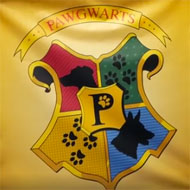
Adopters encouraged to consider personality over breed
A rescue centre in Florida has taken inspiration from the Harry Potter series and is now ‘sorting’ its dogs into Hogwarts houses. The initiative aims to help adopters choose a pet based on personality traits, not looks or breed.
Just like in JK Rowling’s school for witches and wizards, dogs at the Pet Alliance shelter are sorted into Gryffindor, Hufflepuff, Ravenclaw and Slytherin, depending on their personality traits.
Dogs who are quick to figure out a puzzle are placed into Ravenclaw, recognising their knowledge; whilst cheerful, affectionate canines are sorted into Hufflepuff. Meanwhile, those who embrace new things with courage are Gryffindors, and those with the ambition to climb the agility A-frame are placed in Slytherin.
Each dog gets a banner and scarf in his kennel to display his ‘Pawgwarts’ house.
“We want to start a national conversation about dog personality rather than dog breed,” Stephen Bardy, Pet Alliance’s executive director told The Dodo. “That is our ultimate goal and we think this is a fun and universal way for people to start talking. “
As the Sorting Hat can only be found within the walls of Hogwarts, Pet Alliance had to improvise with a team of wizards and a few muggles, who created a series of activities to sort dogs into their houses. The shelter has even put together a quiz so that all dog owners can find out which house their dog belongs in.
Pet Alliance says it has joined many progressive shelters in removing breed labels. The shelter says it has seen an increase in adoptions since introducing the ‘Pawgwarts’ scheme.
Image © Pet Aliiance/Facebook



 The Veterinary Medicines Directorate (VMD) is inviting applications from veterinary students to attend a one-week extramural studies (EMS) placement in July 2026.
The Veterinary Medicines Directorate (VMD) is inviting applications from veterinary students to attend a one-week extramural studies (EMS) placement in July 2026.